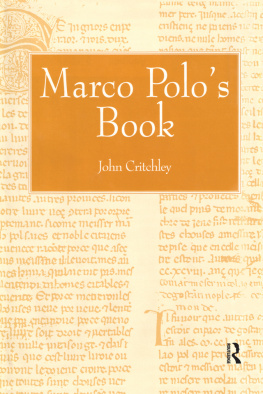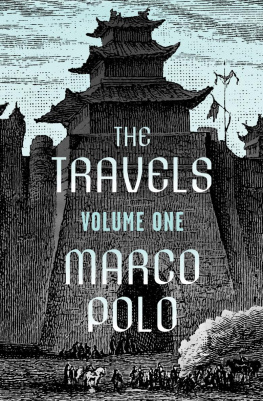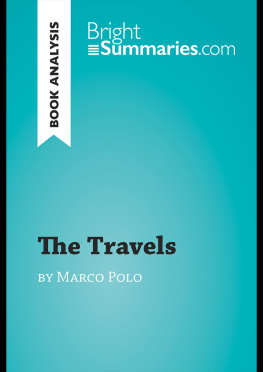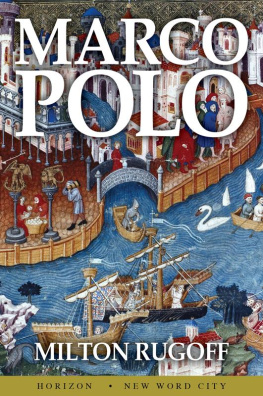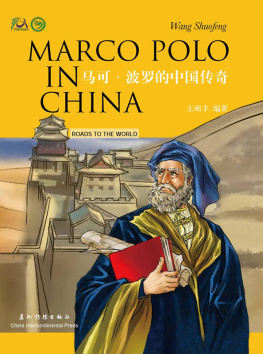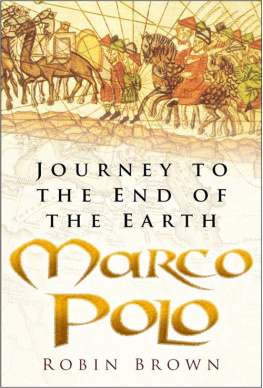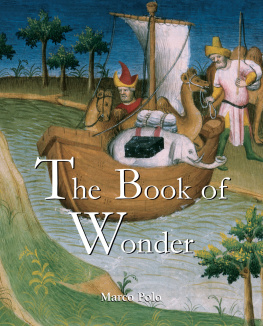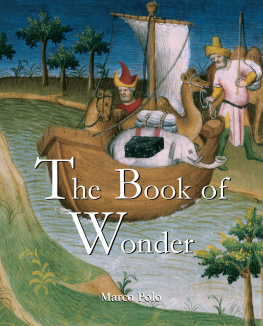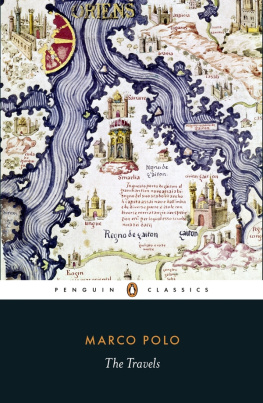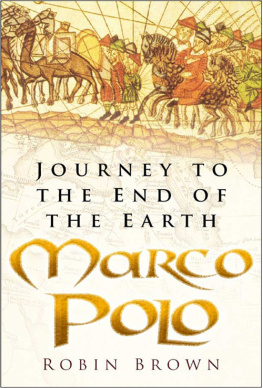Marco Polo's Book
John Critchley
Marco Polo's Book
First published 1992 by Variorum, Ashgate Publishing
Published 2017 by Routledge
2 Park Square, Milton Park, Abingdon, Oxon OX14 4RN
711 Third Avenue, New York, NY 10017, USA
Routledge is an imprint of the Taylor & Francis Group, an informa business
Copyright 1992 by John Critchley
All rights reserved. No part of this book may be reprinted or reproduced or utilised in any form or by any electronic, mechanical, or other means, now known or hereafter invented, including photocopying and recording, or in any information storage or retrieval system, without permission in writing from the publishers.
Notice:
Product or corporate names may be trademarks or registered trademarks, and are used only for identification and explanation without intent to infringe.
A CIP catalogue record for this book is available from the British Library and the US Library of Congress.
Typeset by Department of History and Archaeology, University of Exeter
ISBN 13: 978-0-86078-361-9 (hbk)
- (For other references see the Bibliography)
- Marco Polo, Il Milione, ed. L.Foscolo Benedetto (Florence 1928) (The Italian-French F text; from BN., MS., Fr. 1116. This text is also available, with some amendments, in G. Ronchi (1982), 305-662.)
- MP A.C. Moule & P. Pelliot, Marco Polo: The Description of the World (2 vols. London 1938; rep. New York 1976), i. (The composite English translation.)
- J.V. Prsek, Marka Pavlova z Bentek Milion (Prague 1902) (The Pipino text with parallel Czech translation.)
- R G.B. Ramusio, Navigazioni e Viaggi (3 vols. Venice 156583; rep. 3 vols. Amsterdam 1968; new ed. 6 vols. Turin 1978), iii. 161. (The sixteenth-century Ramusio text.)
- A.C. Moule & P. Pelliot, Marco Polo: The Description of the World, (2 vols. London 1938; rep. New York 1976), ii. (The text.)
Consistency takes second place to familiarity. Readers expert enough to object to the results will have no trouble finding their way from one form to another.
In general, the names of medieval European authors who wrote in Latin are Latinized, thus Marsilius rather than Marsilio, although a well-established alternative form has been allowed precedence thus Jacques de Vitry, rather than Jacobus de (or James of). Some names are anglicized, eg. Philip of Novara, William of Tripoli. Writers who are best-known for their work in the vernacular are generally given in a vernacular form, even if it is not the same vernacular as that of the book in question, eg. Brunetto Latini,
As is increasingly common nowadays, Chinese place names and other technical terms are in Pinyin thus Beijing rather than Peking, Dao-ist not Taoist. But Wade-Giles is retained for familiar historical Chinese personal names and the names of dynasties thus Sung not Song. Mongol names are more of a problem, not least because by Polo's time, or not long afterwards, many groups of Mongol origin were speaking Turkish languages. Is Mongol law to be jasagh or yasa? If only because it is closer to Coleridge's version, Khubilai Khan has been preferred to Qubilai Qan, and other personal names have been made to fall into line. The diacritical marks required to reconstruct the original are ignored. I have opted for 'Tatar', which was recognized as the more correct form even in the thirteenth century 'quod Tattari appellantur, non Tar-tar' although 'Tartar' has been retained where Polo uses it.
Salimbene of Parma (1963), 206-7.
Among the newer attractions of the Petrified Forest National Park in Arizona are petroglyphs, rock drawings, made by the pre-Columbian inhabitants of the region. A nearby sign invites the tourist to locate these drawings in time by saying they were being done in the New World while Marco Polo was making his epic journey across the Old. Should archaeologists of the distant future ever unearth this notice, they might reasonably suppose that in the twentieth century Marco Polo was one of the most famous of all medieval people. They would find corroborative evidence in Venice international airport, named in his honour; and so too have been streets, a satellite and a steam engine, office blocks and ships. In 1898 it was thought appropriate that the cruiser Marco Polo should be dispatched to fly the Italian flag in the Pacific, and three years later it played a part in the Great Powers' suppression of the Boxer uprising.
In 1986 Hiroshi Watanabe produced a comprehensive bibliography on Marco Polo, listing editions and commentaries issued between the first printing, by Creuszner of Nuremberg in 1477, and 1983. Wana-tabe's is a somewhat elusive work which deserves wider circulation: the British Library referred me to the India Office Library. The 280-odd printed editions of Polo listed by Wana tabe is not an accurate figure, since he sometimes takes account of reprints, sometimes not; thus for example he includes twentieth-century reissues of Marsden's translation as well as the original 1818 edition, but not modern printings of Ramu-sio's sixteenth-century text. and I hope this contribution will seed others.
Twentieth-century historians may do at least two things with Marco Polo's book. It is an historical source in its own right, a source which
Polo's book is of a different order from all others in the depth and breadth of its detail. On the other hand the sheer blandness of much of his information on China and India is cited in evidence that he was never there.
But even Polo's proven lies are of the sort which only someone who knew what he was talking about could have told. His most notorious untruth is the story of how Christian engineers in the Polos' service saved the day for the Mongols at the siege of 'Sianfu' (Xiangyang). The main text will be cited at length below.
Then Master Nicolau and his brother and his son, who had in their household an Almainz and a Nestorian Christian, who were good masters of this work, told them that they should make two or three mangonels which would throw stones of three hundred pounds... and they seemed to the Tartars the greatest wonder of the world.
And once the town had been hit by a few rounds from these engines it decided to surrender. The Chinese sources say it was two Muslim experts from Mongol Persia, Isma'il and Ala ad-Din, who built the new weapons. Muslim sources, however, do use the term 'Frankish' man-gonels.
Whether or not Polo was in China, his book is evidence not so much for the history or geography of medieval Asia as for what one, or perhaps two, three or even four Italians of the time Marco Polo, his possible ghost writer Rustichello of Pisa, his translator, Pipino, and the anonymous editor of the 'Z' text thought worth recording about medieval Asia. And we may question whether these people can be taken to be in any way representative. Certainly Marco Polo himself was typical only of a tiny minority, perhaps even a minority of one. To begin with he was male, which makes it unwise to assume his attitudes were shared by more than half the population. When he wrote his book he was middle aged, not a young man or a child. This excludes around two thirds of even just the males. He was a townsman, not a peasant. He was not an ecclesiastic, as were most other writers on Asia in the period. Because there were more of them, ecclesiastical writers can at least be compared with one another. And they were the opinion-formers, or would-be opinion-formers; theirs were the attitudes tending to influence the attitudes of others. If nothing else they may tell us how one was expected to think or behave. Polo was a layman, a layman who was literate when many were not. And among the literate laymen he was the only one of his time to write a book about Asia. In fact we can find no one else quite like Marco Polo. Marco Milione was indeed one in many millions. How then can the work of so extraordinary a person safely be taken as representative of anything?

